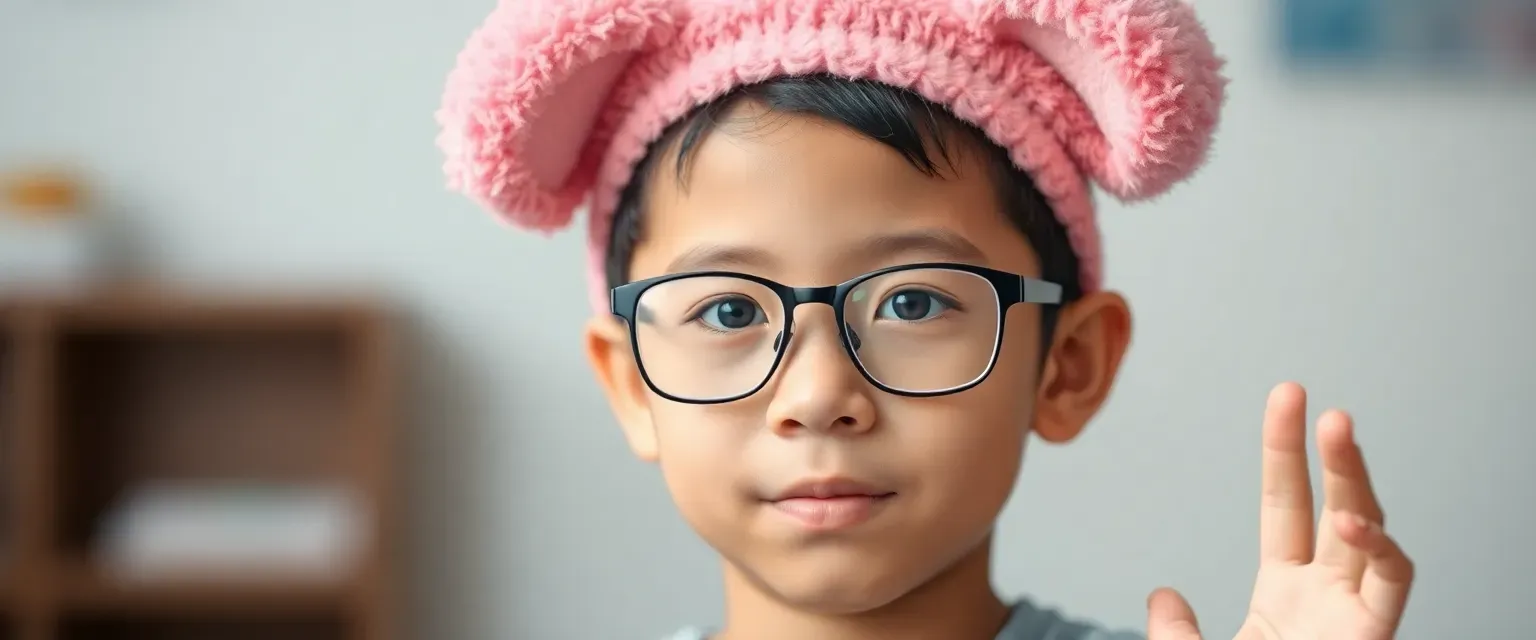JingJing is an eleven-year-old boy with a unique blend of Chinese and Sudanese heritage, which gives him a distinct appearance marked by his warm brown skin and almond-shaped eyes. His hair is a thick, dark mane that he keeps neatly trimmed. Despite his young age, JingJing carries himself with a quiet dignity and intelligence that belies his years. He wears round glasses perched on his nose, giving him an endearing nerdy look that complements his love for all things Aquapets—a popular animated show featuring the characters Puku, Muki, and Tu.
Born without vocal cords, JingJing has never known the sound of his own voice. This silence could have been isolating, but instead it has made him observant and thoughtful, communicating through sign language with an eloquence that speaks volumes more than words ever could. His hands move gracefully as he signs, each gesture precise and full of meaning. Though sometimes he feels a pang of sadness watching the Aquapets chat freely on screen—characters who can speak while he cannot—he finds solace in their adventures and companionship.
JingJing's attire often includes t-shirts adorned with Aquapets imagery, particularly favoring those featuring Puku, the star character whose fluffy pink ears are mirrored in the headband JingJing wears daily. This headband is not just a fashion statement; it’s a lifeline to expression. Given to him by his aide—a kind-hearted woman who understands JingJing’s world better than most—it translates his thoughts into synthetic speech using Puku's voice. The headband even wiggles its fluffy ears when activated, adding a touch of whimsy to every conversation.
Despite this technological marvel at his disposal, life isn't always easy for JingJing. The world around him often fails to accommodate those who communicate differently. At school, he faces challenges when peers and teachers struggle to understand or include him fully in activities. Yet JingJing remains resilient; he uses these moments as opportunities to educate others about sign language and the importance of inclusivity.
His aide plays a crucial role in his life—not just as a helper but as a mentor and friend who encourages JingJing to embrace his uniqueness rather than shy away from it. Together they navigate the complexities of everyday life: visiting doctors who monitor his health closely due to the absence of vocal cords making coughing difficult without assistance from his 'coughing straw,' decorated with decals of Puku, Muki, and Tu.
In quieter moments at home, JingJing immerses himself in drawing scenes inspired by Aquapets episodes or invents new storylines where he imagines himself alongside them on daring escapades undersea or through lush forests inhabited by fantastical creatures only he can conjure up in vivid detail within his mind's eye.
What JingJing wants most is simple yet profound—to be understood beyond words; for people to see past what he lacks physically towards everything else he offers emotionally and intellectually—a rich inner world filled with creativity waiting patiently for discovery if only one takes time enough truly listen beyond spoken language barriers imposed upon him since birth.
The conflicts in JingJing's life stem largely from societal misconceptions about disability coupled with personal frustrations over limitations imposed by nature itself—an internal battle between acceptance versus yearning change despite knowing some things remain immutable regardless how fervently wished otherwise might be so.
Ultimately though hope prevails because within this young boy beats heart full courage determination never give up striving make mark upon world however small large may seem momentary glance outwardly perceived reality others fail recognize potential hidden beneath surface appearances alone define individual worthiness existence shared humanity collective journey together forward unknown future possibilities endless unfold before us all alike.
